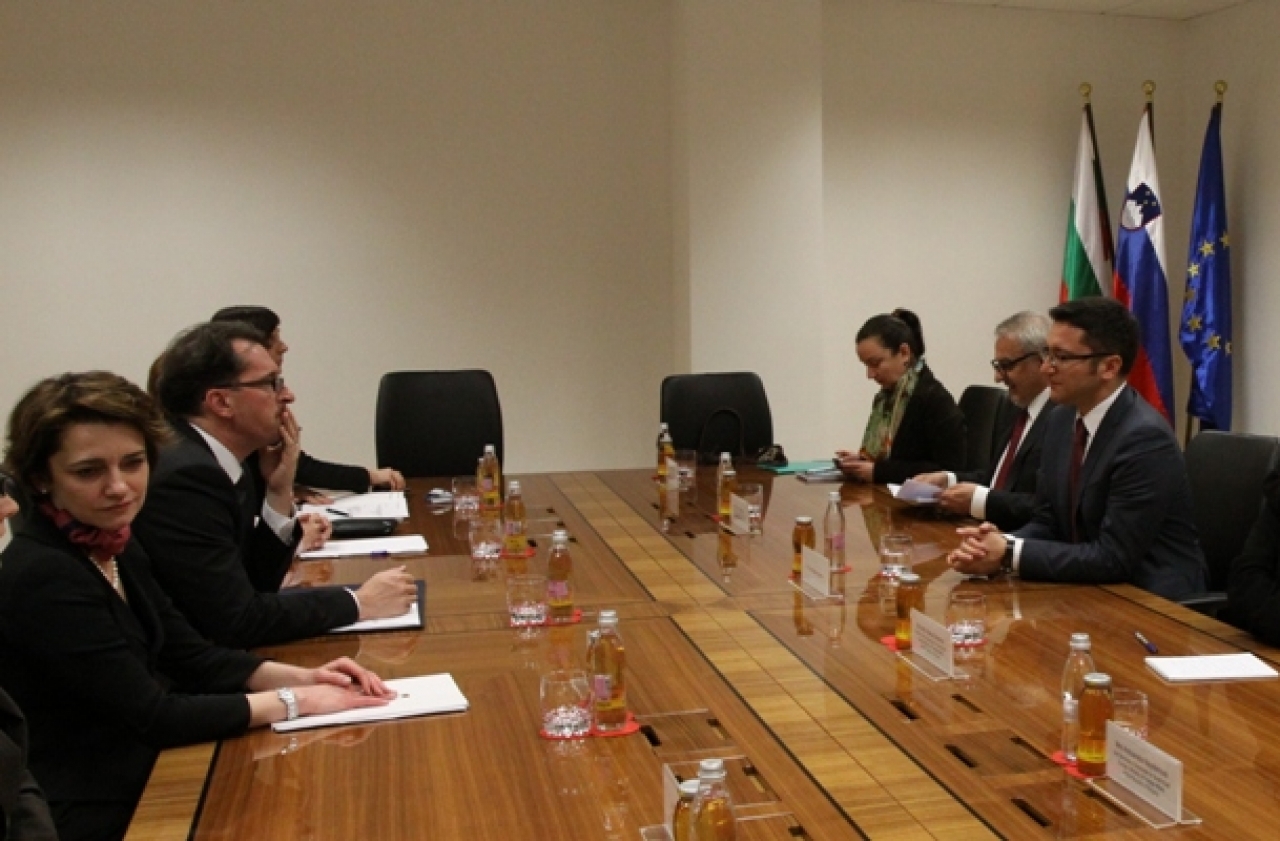The European perspective and the regional cooperation are important for the future of South East Europe
23 April 2014 NewsIn order to build a stable and prosperous South East Europe we need more trust, more people-to-people contacts, more projects at local level which would eventually bring transformations in the historically burdened mentality of the people from the region, said Minister Kristian Vigenin in the public lecture on the topic “The Future of South East Europe- the Bulgarian Perspective”, held at the Faculty of Political Sciences of the Ljubljana University.
Minister Vigenin referred to the excellent opportunities, provided by the Transborder and regional programs of the EU. He pointed out that in the years following our entry to the EU Bulgaria has managed to foster friendships with all the countries in the region. Despite the financial and the economic crisis in Europe we kept an active political dialogue , which has brought pragmatic results such as the building of second bridge between Bulgaria and Romania on the river Danube, as well as the start of the first direct flight connection between Sofia and Belgrade couple of weeks ago, said Kristian Vigenin, adding that providing funding for important infrastructure projects should be a priority on the regional and the EU agenda.
In the years following our EU entry Bulgaria has also invested efforts to bring the countries from the Western Balkans closer to the EU and NATO through transferring relevant experience including expertise and lessons learnt from the negotiations process, added the Bulgarian Foreign Minister. He said that as a member-state of the European Union, Bulgaria remains committed to the European perspective of the entire region and has proven its will and readiness to support the countries from the Western Balkans on the path to their EU integration. “Bulgaria has been and remains ready to share its own experience with the candidate states on their EU accession path,” said Minister Vigenin, adding that we have signed Memorandums of cooperation in the field of European and European integration with all the countries from the Western Balkans. We have also developed a very active cooperation in the field of EU and NATO integration with Montenegro. “We are also open to provide expertise to other candidate countries,” he said.
Apart from bilateral assistance for the EU integration of the countries from the region, Bulgaria also participated in twinning and TAIEX projects. “I believe that it is essential that we build credible and useful partnerships with EU MS with similar understanding and approaches towards the region,” pointed out Minister Vigenin. He emphasized that we should keep the enlargement momentum alive and not let the fatigue to prevail. “Most countries from the region have demonstrated an active and responsible approach towards the EU and NATO and we have to make sure that these processes are irreversible,” the Bulgarian Foreign Minister said.
Kristian Vigenin focused on the regional dimension of Bulgaria's foreign policy, emphasizing that our country does not see the necessity to create new formats of regional cooperation, as this would lead to overlapping spheres of activity and unnecessary waste of resources. "What we need is to adapt and make the best use of what we already have and what proved to be useful along the years," he said.
Minister Vigenin pointed out that Bulgaria pays special importance to the BSEC and informed that among the priorities of the current Bulgarian Chairmanship are the project oriented dimension, the enhanced cooperation between EU and the BSEC through the Black Sea Synergy, as well as further cooperation between the Black Sea and the Danube Region and the Black Sea and the Adriatic-Ionian Region, including through the macroregional strategies of the EU.
In his lecture, the Bulgarian Foreign Minister pointed out that the South-East European Cooperation Process has proven its outstanding significance for promotion of security, stability and prosperity in the region, but the new challenges we face require enhancing the SEECP effectiveness, mainly through emphasizing on the project-oriented cooperation. Kristian Vigenin focused on the the importance of strengthening the interaction between SEECP and other international and regional organizations and institutions, with priority on the European Union. As another option for fruitful cooperation he identified the creation of synergy between SEECP and other formats of regional cooperation such as the EU Strategy for the Danube Region and the Black Sea Economic Cooperation.
The regional cooperation in its parliamentary dimension was the topic of conversation during the today’s meeting of Minister Kristian Vigenin and the Chairman of the National Assembly of the Republic of Slovenia, Janko Weber.
Bulgaria and Slovenia have many common positions and I hope that we will be able to intensify the bilateral relations at all levels, including the parliamentary one. There are number of issues on which I am convinced that our parliaments can cooperate, said Minister Vigenin. He gave as example the exchange of ideas on the role of national parliaments in the development of the European Union and the formation of the European legislation.
Kristian Vigenin and Janko Weber discussed also the commitment of the parliamentarians in support of the European future of the region. The role of the Parliament is important because in the Western Balkan countries these institutions are facing an active process of synchronizing the legislation, said the Bulgarian Foreign Minister.
During his visit to Slovenia, he met also with the Deputy Prime Minister and Interior Minister, Gregor Virant. One of the main topics of the conversation was Bulgaria's accession to the Schengen area and Minister Virant reaffirmed his country's position in support of Bulgaria's accession to Schengen.

